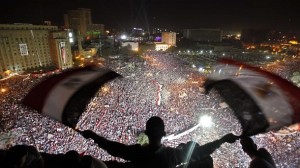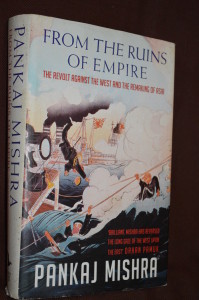
 While speaking about his new book, From the Ruins of Empire: The revolt against the West and the remaking of Asia, noted author Pankaj Mishra said: “In this basic quest for dignity and equality and release from humiliation – so obvious yet so rarely discussed – are grounded all the events that you speak of, whether it’s the Arab Spring or the rise of China.”
While speaking about his new book, From the Ruins of Empire: The revolt against the West and the remaking of Asia, noted author Pankaj Mishra said: “In this basic quest for dignity and equality and release from humiliation – so obvious yet so rarely discussed – are grounded all the events that you speak of, whether it’s the Arab Spring or the rise of China.”
The ongoing blood bath in Egypt and the response of the West to the military coup that preceded it, once again reiterates that secular liberals in the West and the elite in the Muslim world, refuse a serious engagement with Islam, believing its values to be inherently barbaric, undemocratic and incompatible with the modern world. When the choice is reduced to the binary of ‘liberalism versus Islamofascism’, brutal force becomes a legitimate tool against the Islamic monster and the events unfolding in Egypt is a classic example of this reductionism.
Whether we like it or not, Islam has come up as a credible alternative to the western secular democracy, at least in the Muslim majority countries. There were two forces which stimulated this search for alternatives. 1. Imperialistic policies of the US-led West, which largely served the political and economic interests of the US. 2. Rapid modernisation of Muslim countries in tune with the western-secular values under authoritarian rulers in Muslim countries.
The first led to the erosion of credibility of the west in the region and the latter provided a fertile ground for political Islam, which advocated a larger role for religion in the public life. Muslim Brotherhood in Egypt, Ennahda in Tunisia and Justice and Development Party (AKP) in Turkey were in the forefront of this struggle between ‘religion and modernity’. But the post colonial elite in these countries treated Islam as an obstacle to the development of the nation and often cracked down Islamists groups and Brotherhood bore the maximum brunt since its inception in 1928.
Describing the characteristics of this policy Pankaj Mishra writes, “Modernisation became synonymous with the removal of Islam from the centre of public life, the devalidation of Islamic education and law, and the marginalisation of Islamic scholars.”
As Mishra rightly observed, modernisation and economic growth imposed by Western powers had radically disrupted the old cohesion of Islamic societies by producing new classes and redistributing power among them. In many instances-Egypt, Tunisia, Indonesia, Algeria- the post colonial Muslim states followed the colonial state policies, especially in its suspicion of popular Islam and tried to restrict if not eliminate altogether the latter’s role in public life.
The Arab Spring was an outburst of the anger simmering in these countries for many decades and it escalated after terror was unleashed by the West across the Muslim world in the name of ‘War on terror’ after 9/11.
After the revolution, Islamists actively participated in the political democracy and were elected with thumping majority in Egypt and Tunisia. But the liberals and leftist groups in Egypt, who also actively participated in the revolution, joined the military to oust a democratically elected government and the tacit support of the West for this coup was beyond doubt.
Participation of Brotherhood in the democratic election was an ideal opportunity to engage with them on equal terms. As Mishra observed “Islam was as much a universalising ideology as Western modernity is now, and it successfully shaped distinctive political systems, economic and cultural attitudes across a wide geographical region.” Brotherhood should have been given a fair time to show how far they can live up to this expectation.
But the hasty military coup set a dangerous precedence and attempt to bring democracy through the barrels of the gun betrayed the very spirit of Arab Spring. The worst fears of Mishra have come true. “With overwhelmingly young populations, Arab countries such as Egypt and Tunisia are now trying to build representative democracy. Failure, which is not inconceivable, will provoke yet another generational shift to hard-line Islamic ideas and organisations. Islam remains a gigantic powder keg, likely to blow up any time.”